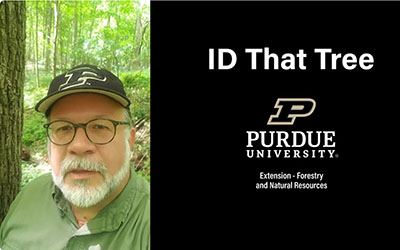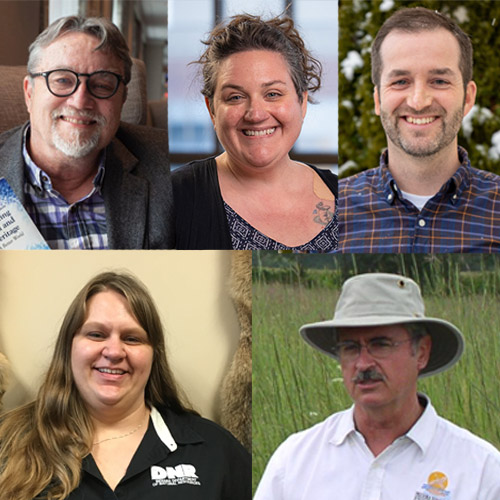FNR Introduces New Faculty and Staff Members
Nine individuals have joined the Purdue Department of Forestry and Natural Resources in faculty or staff roles since August 2021.
Dr. Peter Euclide, Laura Fehling, Theresa Hudson, Ben McCallister, Rhonda Taylor, Abby Valachovic and Stephen Volz have joined the FNR staff in the past year, while Dr. Morgan Furze and Dr. Dylan Wainwright joined the faculty in August 2022 with 25% FNR appointments. Furze has a majority appointment in the department of Botany and Plant Pathology, while Wainwright’s major appointment is in the department of Biological Sciences.
Peter Euclide
Dr. Peter Euclide joined the FNR staff in 2021 as a collaborative researcher between the department of biology and FNR under Dr. Mark Christie. Beginning in October 2022, he will begin working more extensively with Dr. Tomas Höök and Illinois-Indiana Sea Grant as a fisheries specialist. Euclide uses a combination of modern genomic techniques and ecology to answer questions related to animal movement, local adaptation, and evolution to inform management and conservation. Much of his research has investigated the population ecology, genetic structure and local adaptation of fishes in the Great Lakes, including walleye, lake trout, yellow perch and alewife.
“In my short time at Purdue the FNR department has been a great and welcoming place to work and I am excited to be part of the team of scientists conducting natural resources research in the Christie and Höök laboratories,” Euclide said.
Euclide comes to Purdue after spending the past year as a postdoctoral research associate at the University of Wisconsin-Milwaukee, where he studied population genomics of fish and mammals and managed a collaborative Great Lakes wide walleye research program. Prior to that, he was a genetics research scientist for the U.S. Geological Survey’s Wisconsin Cooperative Fishery Unit. In both positions, he worked primarily on population genetics of freshwater fisheries, eDNA metabarcoding, and the development of genetic marker panels for natural resource management of walleye, lake whitefish and white-tailed deer.
Euclide completed his undergraduate degree in organismal biology at Kent State University in 2012, graduating summa cum laude. He went on to earn his master of science degree in 2015 from the Rubenstein School of Environment and Natural Resources at the University of Vermont, presenting his thesis on “Fixed versus plastic partial migration of the aquatic macroinvertebrate, Mysis diluviana, in Lake Champlain.” In 2018, Euclide earned his PhD from the department of biology at Vermont, presenting his dissertation on “Genetic consequences of habitat fragmentation in the Champlain basin.”
Euclide’s research has produced more than 20 publications, including three in 2022: “Genome-wide genetic diversity may help identify fine-scale genetic structure among Lake Whitefish spawning stocks in Lake Erie” in the Journal of Great Lakes Research; “Further evidence from common garden rearing experiments of heritable traits separating lean and siscowet lake charr (Salvelinus namaycush) ecotypes” in Molecular Ecology; and “A chromosomal inversion may facilitate adaptation despite periodic gene flow in a freshwater fish” in Ecology and Evolution..
In addition to his research, Euclide acts as a manuscript reviewer for several publications, including the Journal of Great Lakes Research, the Canadian Journal of Fisheries and Aquatic Science, the North American Journal of Fisheries Management, Ecology and Evolution, PLoS1 and Molecular Ecology.
In Dr. Christie’s lab, Euclide is working a number of different projects, including a study using whole-genome sequencing to investigate the evolution of yellow perch populations in Lake Michigan. The focus of these studies is to understand the origin of yellow perch in drowned river mouth lakes and to investigate how fisheries induced evolution has influenced yellow perch populations in southern Lake Michigan. In addition, Euclide recently began a new line of research looking at the influence of hatcheries on the evolution of Pink Salmon in Alaska.
He recently received a grant from the Great Lakes Fish and Wildlife Restoration Act, which will fund research evaluating the genetic stock structure of lake whitefish in Lake Erie and evaluate the potential for existing genetic marker panels to aid with management of Lake Erie lake whitefish recreation and commercial harvest.
Laura Fehling
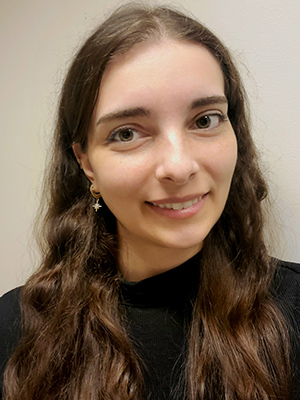 Laura Fehling joined FNR on June 1 in the role of Natural Resources Lab Coordinator and Collections Curator. Fehling comes to Purdue after completing her master of science degree in Botany at Miami University in Oxford, Ohio, in May 2022.
Laura Fehling joined FNR on June 1 in the role of Natural Resources Lab Coordinator and Collections Curator. Fehling comes to Purdue after completing her master of science degree in Botany at Miami University in Oxford, Ohio, in May 2022.
“I am very excited to be taking on this new position with Purdue FNR which provides a unique opportunity to work in multiple roles as a teacher, curator, and director for summer practicum,” Fehling said.
Fehling’s thesis work tested the context dependency and benefits in a multispecies mutualism working at a greenhouse, field site, and laboratory with plants, insects and microbes. She also acted as a graduate teaching assistant for three courses: Biological Concepts: Ecology, Evolution, Genetics and Diversity (BIO 115), Biological Concepts: Structure, Function, Cellular, and Molecular Biology (BIO 116) and Field Botany (BIO 155).
As an undergraduate at the University of Wisconsin-Green Bay, Fehling majored in environmental science and minored in biology. She served as a research intern at the Forest Preserves of Cook County in River Forest, Illinois, building a database on native plant species and their relevant physiological traits, habits and other factors affecting the vigor of the species. In that role, she also removed invasive species, collected seeds and maintained native plant species, while using GPS and technology to map signage in forest preserves throughout the county. Fehling also volunteered with Openlands Treekeepers in the Chicago region, earning certifications in tree identification, planting and care. She also planted, trimmed and maintained trees throughout the region, while working to educate the public on the importance of native trees and best practices to care for them.
Fehling also gained experience in plant biology and conservation as an herbarium research assistant at Gary A. Fewless Herbarium in Green Bay and as a National Science Foundation Research Experience for Undergraduates intern at the Chicago Botanic Gardens. At the herbarium, she collected plant specimens, made professional mounts and maintained storage and organization of the specimens, while cataloguing them in an online database. As an REU intern, Fehling worked on a project regarding the impact of drought on plant-herbivore interactions involving evening primrose and hawkmoth caterpillars. She also worked in a greenhouse and lab maintaining plants as well as scientific equipment and tools. As an undergraduate researcher at UW-Green Bay, Fehling designed and conducted an experiment involving the use of mealworms to consume and recycle otherwise non-biodegradable polystyrene waste.
In her role as Natural Resources Lab Coordinator, Fehling will teach Vertebrate Systematics and Ecology (FNR 242 and 252) and Dendrology (FNR 225). She also will serve as Summer Practicum director, and maintain the departmental vertebrate and herbarium/arboretum specimen collection.
Morgan Furze
Dr. Morgan Furze began her appointment as an assistant professor in Botany and Plant Pathology and Forestry and Natural Resources in August 2022.
Furze comes to Purdue after spending the last year as a U.S. Department of Agriculture National Institute of Food and Agriculture (USDA NIFA) postdoctoral fellow in the McElrone lab of the University of California, Davis Department of Viticulture and Enology. This followed a two-year stint as the Donnelley postdoctoral fellow in the Brodersen lab at the Yale University School of the Environment.
Furze earned her bachelor’s degree in biology from Bucknell University in 2012. She then completed her PhD in organismic and evolutionary biology from Harvard University in 2019. Her dissertation was on “Understanding Whole-Plant Nonstructural Carbohydrate Storage in a Changing World.”
“I’m looking forward to collaborating with everyone in the FNR community through research, teaching and extension,” Furze said.
In 2019, Furze was awarded a Rising Star in Organismal Botany Award from the Society for Integrative and Comparative Biology. She also has received Distinction in Teaching Awards from Harvard twice for her work with OEB 52 Biology of Plants (2018) and OEB 10 Foundations of Biological Diversity (2017).
Her research focuses on plant ecophysiology. Furze utilizes tools from plant physiology and ecology along with microCT imaging and machine learning technology to explore nonstructural carbohydrate storage and allocation in response to stress in ecologically and economically important plants, especially trees, to help quantify and predict plant and ecosystem responses to global change.
Furze has published 11 papers, most recently discussing “Ecologically driven selection of nonstructural carbohydrate storage in oak trees” in New Phytologist, and has two more in review.
She is the program officer-elect for the Division of Botany with the Society for Integrative and Comparative Biology and was a representative on that organization’s student-postdoctoral affairs committee. She also is an assistant editor of Integrative and Comparative Biology and a reviews editor for Frontiers in Forests and Global Change.
Theresa Hudson
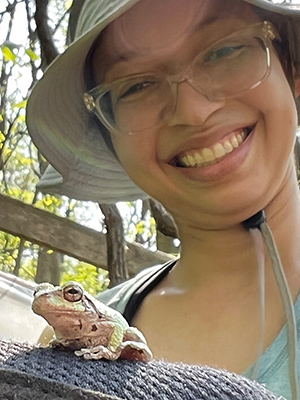 Theresa Hudson began working as a research technician in Dr. Jeff Dukes’ lab in April 2022. She is the lead technician on an experiment at Martell Forest, where researchers are studying how plants’ exposure to water stress over time affects its subsequent responses to water stress, i.e. are plants able to acclimate or make physiological adjustment that allow them to cope with water stress better the more times they experience it.
Theresa Hudson began working as a research technician in Dr. Jeff Dukes’ lab in April 2022. She is the lead technician on an experiment at Martell Forest, where researchers are studying how plants’ exposure to water stress over time affects its subsequent responses to water stress, i.e. are plants able to acclimate or make physiological adjustment that allow them to cope with water stress better the more times they experience it.
“"I am excited to contribute to research that has the potential to affect our understanding of how climate change will impact the world’s ecosystem,” Hudson said. “Since starting my career in ecology and conservation way back in undergrad, I have only ever wanted to make a positive impact on the environment through my work, and this position helps me do that. I am also excited to broaden my horizons by doing work in the field of forestry and to learn several new skillsets along the way. Both of which, I am happy to say, have already begun".
Hudson earned her bachelor’s degree in environmental science from IUPUI (Indiana University Purdue University Indianapolis) in 2018. She went on to complete a master of science degree in conservation ecology and sustainable development from the University of Georgia in 2021. Her main interests include the conservation of endangered species and their habitats in the face of anthropogenic change including urbanization and global climate change.
Hudson was a lab tech assistant in the IUPUI Department of Earth Sciences as an undergraduate student, working on projects funded by the Undergraduate Research Opportunity Program. She investigated the origin and characteristics of trilobite fossils through the use of a microscope, Adobe Photoshop and library research as well as collaboration with museums and universities. She also identified algae found in the Antarctic tundra by collaborating with labs and researchers to attain DNA information, radio carbon age and electron microscope images.
As an undergraduate research intern at the Gobabeb Research and Training Center in the Namib Desert in Namibia, Hudson collected plant and soil samples during fog and dew events and measured plant and soil water potential to determine stable isotope composition and reliance of desert plants on fog and dew as a water resource.
As a graduate researcher at the El Verde Field Station in the El Yunque National Forest in Puerto Rico, she planned, set up and conducted a six-week field experiment in a montane headwater stream investigating the top-down effect of shrimp on algae.
As a volunteer with the Environmental Law Practicum in Athens, Georgia, Hudson researched the conservation status and ecology of sea turtle species in the water surrounding the United States to determine improved conservation strategies and required protections for different species based on the individual and varying severity of the threats they faced. Along with an interdisciplinary team of graduate students, she then drafted that research into a federal legislative proposal for the Georgia Department of Natural Resources.
In addition to her research, Hudson worked as a lab instructor for an undergraduate ecology lab course covering endangered species, ecological succession, food webs, evolution and disease ecology, as well as field techniques ranging from taking soil cores, measuring soil moisture and pH, sampling and identifying macroinvertebrates, to sampling plants and identifying tree species. Most recently, she worked as a lab technician for the Center for Applied Isotope Studies at the University of Georgia. In that position, she prepared and analyzed soil, algae, plant/animal tissue, bone and mineral samples for carbon and nitrogen isotopes.
Hudson’s research in the Dukes Lab is based in a 25-year old forest stand at Martell Forest, as well as a couple other locations at Martell. Elin Jacobs is leading the modeling portion of the project, while the research also includes collaborators at Indiana University, Los Alamos National Laboratory and Pacific Northwest National Laboratory (PNNL).
Benjamin McCallister
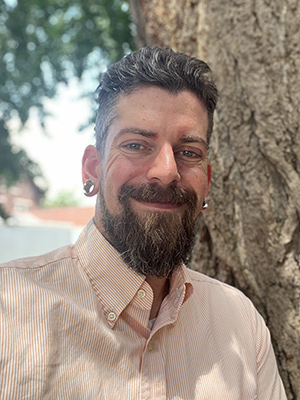 Ben McCallister, who boasts three degrees from Purdue, assumed the role of Urban Forestry Specialist for Purdue FNR and Purdue Extension in July after spending the last year as a senior arborist for the Purdue Grounds Department.
Ben McCallister, who boasts three degrees from Purdue, assumed the role of Urban Forestry Specialist for Purdue FNR and Purdue Extension in July after spending the last year as a senior arborist for the Purdue Grounds Department.
McCallister earned a bachelor of arts degree in photography in 2006, a bachelor of science in forestry with a minor in urban forestry in 2018 and a master’s degree in forestry/urban ecology in August 2021. As a master’s student, he focused his research on use of ground and aerial based LiDAR for studying forest canopy structure.
“I am excited to join the Purdue FNR team as the new Urban Forestry Specialist because I want to share my knowledge, experience, and excitement for trees in the urban environment with students, homeowners, and professionals alike,” McCallister said. “I came to Purdue initially to learn about forestry, but when I first learned about the all the benefits of the urban forest, I knew my path was geared toward urban forestry and arboriculture.”
McCallister brings a plethora of experience in the tree care and arboriculture industries as well as in the classroom. After completing his first degree, he went to Japan where he taught English for eight years, working with students ranging from preschool children to business professionals. After returning to West Lafayette, McCallister acted as a teaching assistant for dendrology (FNR 22500), arboriculture practices (FNR 44400), natural resource information management (FNR 21000) and urban ecology (FNR 58600).
McCallister gained professional experience as a student acting as a tree and grounds crew worker and leader for the Purdue Student Society of Arboriculture and doing invasive species removal at Lugar Forestry Farm. He followed that with internships at Davey Tree (plant health care technician and tree crew), Bellinger’s Professional Grounds Maintenance (tree and grounds crew) and with Purdue FNR (forestry farm intern). At Davey, he applied pesticides and fungicides, trained for tree climbing and proper pruning practices and ensured a safe and clean work environment. At Bellinger’s, McCallister operated chippers, chainsaw, stump grinders and other heavy equipment for residential and commercial customers while organizing rigging ropes from the ground for climbers and performing maintenance on equipment. Within FNR, he assisted the Walnut Council with interactions with landowners and growers, practiced invasive species control, implemented tree stand improvement practices and worked in logging operations.
After completing his second bachelor’s degree, McCallister worked as a climbing arborist with Bartlett Tree Experts, planting and removing trees, pruning trees using climbing techniques and from the bucket truck, and also participating in and teaching training activities for the tree crews. While finishing up his master’s degree, he worked as a climbing instructor for LP Consulting Group, where he designed and implemented a curriculum for introductory climbing, and also presented information and demonstrations on climbing equipment and safety.
Most recently, McCallister spent a year as the senior arborist for the Purdue Grounds Department. In that role, he managed all tree maintenance activities from pruning and planting to spraying and removals. He supervised tree care crews and assisted landscape architects and campus planners on proper tree selection and placement for planting projects.
As the urban forestry specialist, McCallister will be responsible for developing and delivering a statewide extension programming in arboriculture, tree care, and urban forestry. He will also teach undergraduate courses in Arboriculture Practices, Urban Forest Issues, and the Urban Forestry Summer Practicum module.
Rhonda Taylor
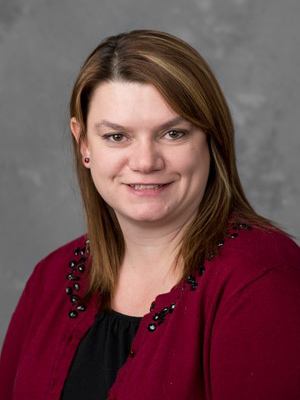 Rhonda Taylor, a 2004 wildlife and land management alumna, was hired as the Genomics Laboratory Manager in July. Taylor has spent the last nine years as a research associate/assistant, laboratory manager and extension specialist at Purdue. Taylor comes to FNR from the Department of Food Science.
Rhonda Taylor, a 2004 wildlife and land management alumna, was hired as the Genomics Laboratory Manager in July. Taylor has spent the last nine years as a research associate/assistant, laboratory manager and extension specialist at Purdue. Taylor comes to FNR from the Department of Food Science.
“I am very excited to be a part of the FNR team,” Taylor said. “This position is an amazing opportunity for me to learn and engage with the students and faculty while assisting in the coordination of research activities for FESSL and the Genetics lab.”
In addition to her undergraduate degree, Taylor has an associate’s degree of applied science in biotechnology as well as a master in science in management and leadership certificate for project management from Purdue Global. She is on track to graduate with a master of science degree in management and leadership – project management from Purdue Global in 2023.
Taylor has a long-standing history in applied research, molecular and microbiological applications, management, teaching, supervision and safety.
Taylor joined the Department of Food Science in 2013 as a research assistant and food safety lab manager, working mainly with foodborne pathogens related to beef and poultry. In 2017, she became the Food Science outreach extension specialist and food processing lab manager, focusing on validation studies for industries. She assisted the food science extension program by managing SafeProduceIN and Purdue’s ServSafe website. She also acted as an instructor for the Produce Safety Alliance and the ServSafe program. From December 2021 to her transition to her new role, Taylor acted as a research associate and extension outreach specialist, where she assisted graduate students and industrial partners with projects related to food safety and processing by developing and conducting research focusing on acidified and low-acid foods.
Taylor was the safety chairperson for the department of food science and the point of contact/program coordinator for the fresh produce industry, ServSafe program, home-based vendors, food processing validation studies and food processing workshops.
In addition, Taylor hired, trained and supervised undergraduate students in her labs, while also overseeing four to 10 graduate students. She managed maintained, organized and purchased lab equipment, managed quality control, provided training and coordinated workflow, while also collecting and analyzing data and reporting research data.
Prior to joining the department of Food science in 2013, Taylor served as a lab technician at Dow AgroSciences, as a seed analyst for the Hardwood Tree Improvement and Regeneration Center and completed an internship in the Molecular Tree Physiology Lab in FNR.
At Dow AgroSciences, she operated autoclaves, calibrated equipment, maintained inventories and operated equipment designed to assist in soybean transformation and performed plant tissue cultures. With the HTIRC, Taylor prepared, developed and evaluated x-rays and processed seeds for long-term storage, performed seed viability analysis and excised embryos, and collected critical data and served as a data curator. In the tree physiology lab, she conducted germination studies, prepared and tacked samples in the greenhouse and operated HPLC and QRT-PCR machines.
As the Genomics Lab Manager, Taylor will coordinate research activities in the Forest Ecology, Silviculture and Soils (FESSL) and the genetics labs. She will help provide management, oversight, supervision and maintenance of the labs. She also will train and oversee departmental personnel, students and visiting scientists in proper and safe methods, techniques and procedures for use of specific research equipment.
Abby Valachovic
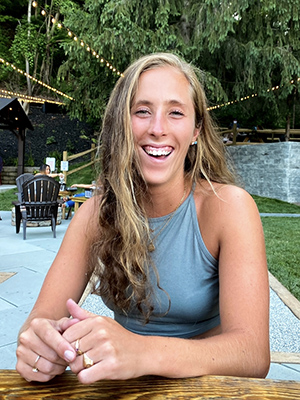 Abby Valachovic began her role as laboratory manager for the new Wildlife Ecology Research Center (WERF) in May after completing her master’s degree in biology from Miami University in Oxford, Ohio. Valachovic earned her bachelor’s degree in biology from Union College in Schenectady, New York, in 2020, before beginning her thesis research on "Understanding the role of a nuclear receptor pathway (PPAR) on fat accumulation and mobilization in the migratory Gray Catbird (Dumetella carolinensis)."
Abby Valachovic began her role as laboratory manager for the new Wildlife Ecology Research Center (WERF) in May after completing her master’s degree in biology from Miami University in Oxford, Ohio. Valachovic earned her bachelor’s degree in biology from Union College in Schenectady, New York, in 2020, before beginning her thesis research on "Understanding the role of a nuclear receptor pathway (PPAR) on fat accumulation and mobilization in the migratory Gray Catbird (Dumetella carolinensis)."
“I am incredibly honored to work at such a prestigious university like Purdue and to be afforded the opportunity to start my career off in a field that directly aligns with my interests,” Valachovic said. “I have loved studying biology for the past 6+ years and cannot wait to put my education to use. I am eager to learn more about management, ecotoxicology research, and Purdue's atmosphere!"
Valachovic gained experience in ecology, wildlife, teaching and research during both her undergraduate and graduate studies. She was a graduate student mentor to her lab and field assistants. She also acted as lab instructor for Bio 161 Human Physiology for Non-Majors and was the instructor of record and teaching assistant for a two-day Intro to R Part II Workshop. Her research included bird banding, mist netting and bird ID, as well as work with mice and birds, looking at the importance of certain target genes such as PPAR with the role of physiological aspects of migration.
As an undergraduate researcher and honors senior thesis researcher, Valachovic looked at the physiological effects of grasshoppers on jump distance and frequency and how these insects prioritize the trade-offs between gravidity and survival in life. She also acted as a research assistant intern for the department of environmental conservation in Albany, New York, where she identified, selected and sampled aviary and reptile specimens to contribute to a research study assessing the ecosystem in upstate New York to determine the effects of chemical contaminants on wildlife populations, primarily per- and polyfluoroalkyl (PFAS). Valachovic studied abroad in India and Australia as an undergraduate student, while also competing in varsity cross country and indoor and outdoor track and field.
As the lab manager at WERF, Valachovic will coordinate personnel activity, oversee research projects and coordinate animal collection and husbandry. She also will ensure proper maintenance of lab equipment, chemicals and biologicals and design and implement protocols pertaining to biological analyses. Valachovic will also train and oversee researchers, including graduate and undergraduate students in proper and safe methods, techniques and procedures for use of research equipment. She also will assist in teaching hands-on wildlife courses, such as Wildlife Investigational Techniques and Wildlife Habitat Management.
Stephen Volz
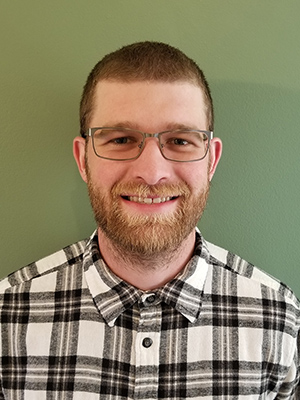 Stephen Volz joined the FNR staff as an assistant forester, working at the Southern Indiana Purdue Agricultural Center (SIPAC) and Southeastern Indiana Purdue Ag Center (SEPAC).
Stephen Volz joined the FNR staff as an assistant forester, working at the Southern Indiana Purdue Agricultural Center (SIPAC) and Southeastern Indiana Purdue Ag Center (SEPAC).
Volz, a native of southeastern Indiana earned his bachelor’s in forestry from Purdue in 2018. He went on to work as a forester for Habitat Solutions and a procurement forester for Napoleon Hardwood Lumber Company and Salem Hardwood Lumber Company.
“I’m excited to be a part of a team of foresters that have good forestry practices as their primary management focus,” Volz said.
With Habitat Solutions, he identified and removed invasive species, conducted forest inventories on private lands, performed timber stand improvement, marked timber for sales, installed warm-season prairies and planted trees and shrubs among other duties.
At Napoleon, he oversaw logging operations and close-out work, scaled, graded and inventoried logs in the log yard, cruised timber sales and operated and serviced fleet vehicles and heavy equipment. At that position as well as at Salem, Volz cruised timber sales to determine volume and quality to provide appropriate bids, marked off and bucked veneer, stave and grade logs to maximize yield and profit, and discussed timber quality and potential for timber sales with private landowners. At Salem, he also managed the company forestland to provide quality and growth.
In his role as assistant forester, Volz will assist Purdue FNR property managers in southern Indiana with implementing management plans, maintaining properties and supporting research projects and extension/teaching programming. His work will include invasive plant control, forest inventory, timber stand improvement, wildlife habitat improvement, prescribed fire, timber marking and harvesting.
“The FNR forest management group is super excited to have Stephen join the team,” forester Don Carlson said. “His forestry skills, energetic work ethic, and passion for natural resource stewardship will contribute greatly to expanding the use of FNR’s woodlands for extension, research, and teaching.”
Dylan Wainwright
Dr. Dylan Wainwright joined the Department of Biological Sciences faculty as an assistant professor in August 2022. He has a background in biomechanics, functional morphology and fish biology.
Wainwright comes to Purdue after spending the last three years as an NSF postdoctoral fellow under Dr. Thomas Neal at Yale University, working in conjunction with the University of California, Davis and Harvard University.
Wainwright earned his bachelor’s degree in biology from Duke University in 2012. He completed his PhD in organismic and evolutionary biology at Harvard in 2019. His dissertation was on “Fish scales: morphology, evolution and function.”
Wainwright was most recently offered a position as a Gerstner Scholar and Lerner-Gray fellow at the American Museum of Natural History in New York City, but declined this to join the Purdue community.
“I’m excited to meet all of great faculty in FNR and I’m eager to expand my research in a more applied direction,” Wainwright said. “I look forward to learning from you all soon.”
His research focuses on evolution, biomechanics and functional morphology as well as diverse and multifunctional surfaces of aquatic vertebrates. His 23 publications have included work with northern clingfish, remora, bluegill sunfish and bigeye tuna as well as research on skin surfaces, including those of sharks and dolphins. His most recent work on “Evolutionary patterns of scale morphology in damselfishes” was published in the Biological Journal of the Linnean Society in 2022.
Wainwright was co-instructor of a course titled BIOS P-13000, Surf and Turf: An introduction to marine and terrestrial biology for Harvard’s pre-college program in 2018 and organized and co-instructed a graduate seminar on applying for fellowships. He also has been a teaching assistant for lab-based courses in human anatomy and fish biology. As part of the Harvard Teach Program, he helped promote equity and inclusion in STEM education by interacting with middle school students from inner-city Boston schools and discussing how science is important to their daily lives. He also was a science education partner at the Harvard Museums of Science and Culture and spent seven years as part of the Scientist of the Month program at Evergreen School.




